
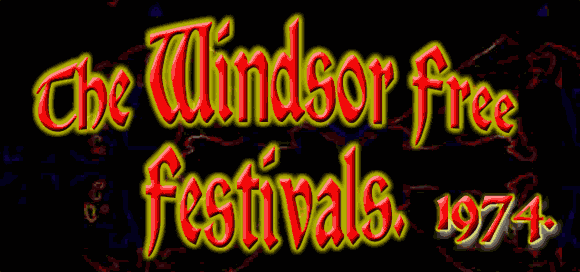
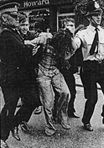
The Archive.
View this site at 800 x 600 resolution or higher for best results. Last updated 2-27-02
 |

|
 |
MAYA , the Windsor Free Nation
Was an alternative newspaper that was circulated during and after the 1974 festival. This issue was created after the festival and is chock a block full of pictures covering the police action that evicted the remaining festival attendees .The following statement was made by the Reverend Brian Ferguson .
 |
IT BEGAN AS A DREAM OF AN EXPERIMENT IN A NEW SOCIETY OF LOVE AND MUTUAL CO-OPERATION, FUNCTIONED FOR SIX SHORT DAYS AS A MODEL WORLD WHERE ALL DIFFERENCES OF CREED, COLOUR OR POLITICS WERE NON-EXISTENT, AND ENDED IN A NIGHTMARE THAT BORE MORE THAN A PASSING RESEMBLANCE TO THE WOUNDED KNEE" MASSACRE. THE THIRD WINDSOR FREE FESTIVAL WAS NOT A POP-MUSIC FESTIVAL BUT A GATHERING OF THOUSANDS OF PEOPLE, YOUNG AND OLD, TO EXPERIENCE FOR NINE DAYS THE REALISATION OF LIVING WHAT HAS BEEN TERMED" AN ALTERNATIVE SOCIETY", THE CREATION OF A TENT CITY OF PEOPLE WHO LONGED TO RETURN TO THE SIMPLER LIFE OF THE TRIBAL CONCEPT. WHILE THE WORLD OUTSIDE LOOKED IN AND SAW NOTHING BUT THE STAGES FROM WHICH BLARED ROCK MUSIC, THOSE WHO PENETRATED DEEPER BECAME AWARE THAT BY COMPARISON TO WHAT WAS ACTUALLY TAKING PLACE, THE MUSIC WAS INCIDENTAL.
The only comparison to the true functioning of the festival that comes to mind is the annual gathering of the tribes of north American Indians. Grouped around each stage area were a collection of tents and various tribes or sub-societies, many of the religious groups such as the Divine Light Mission, a children of God Hare Krishna Temple, the Wallies, various yoga sects, and so forth, plus various political groups ranging from Liberals to Anarchists. And for the duration of the Festival all the differences were forgotten as they functioned as one people.
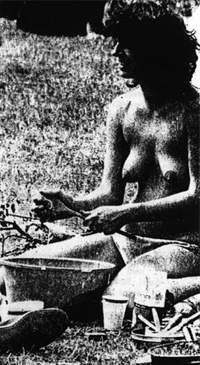 |
At 11 am each day the People met at stage A to discuss and democratically vote upon the important issues affecting the overall operation of the festival site, deciding upon such things as feeding, sanitation, policing to keep thefts and the sale of hard drugs at the barest possible minimum (it is interesting to note that this was done far more efficiently than in any other other community in Britain. At 9 each day , leadership representatives from each group met along with the stage manager of each area of the site to discuss. The experiences of the day and to form proposals for the large meeting in the morning. It was an operation of non-bureaucratic city government that worked. We must not make the mistake of thinking that it was entirely without problems. From the first day, the police themselves had continuously posed a problem to the overall operation of the festival had continual harassment of people coming to and from the site. Many people complained that within the space of a single hour they would be stopped and strip searched as often as four times, frequently by the same officers, although no drugs were found on their person on the first occasion. The police did not come onto the festival property, but at night would creep up to tents near the perimeter and harass people by cutting the guy ropes of tents, searching cars and then placing the protesting individuals under arrest. The situation quickly arrived at the point where an air of a city under siege by marauding savages prevailed. Anxiety began to mount and at each meeting of group leaders and the general morning one, the problem of police harassment was discussed, a number of solutions ranging from forming a passive mass circle around anyone the police were attempting to arrest to a nude march of several thousand protesters on the town of Windsor was decided upon, but they were all enforced with proviso that at no time must there be any violence. Love and passive resistance was the order. Violence was to be avoided at all costs. |
Despite
the problem of the police, or perhaps as a result of it, the people resident
in the festival became more united daily. Members of various religious groups
worked together, either in the operation of the medical tent - in actuality
a field hospital operated by the Divine Light Mission, the feeding of thousands
who had no funds or the daily collection of garbage and litter, and the digging
of toilet facilities. A daily newspaper was operated on the site, several information
tents, a children's playgroup and lost child centre were set up and even merchants
on the festival site either lowered their prices far below that elsewhere or
gave the food away outright.
|
On
the Wednesday afternoon the first real test of unity and indication of
the subtle change created |
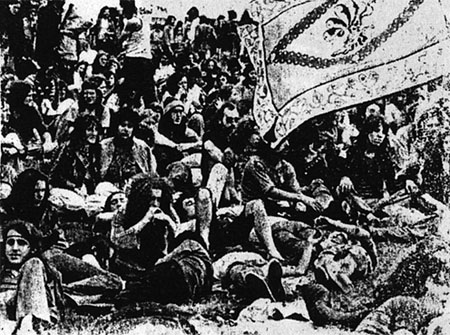 |
Just before that nights meeting a message was relayed to us that Mr Forder had been called away to another assignment , but that they would be there for the morning meeting . This promise was kept , but not in the manner implied.
Thursday 30th August.
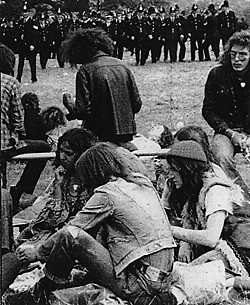 |
I
had gone to bed about 11pm and was sleeping quite deeply. There was no longer
any fear of an attack from without. Suddenly I was wrenched from sleep by
screams of ' wakeup, wakeup its the pigs they've attacked, there are hundreds
of them , they are all over the place.'Looking out of my tent I was reminded
of the scene from Little Big Man when the army attacked wounded knee with
tents being overturned and as I saw a mass of blue uniform's charging through
the morning mist at the sleeping city of tents. In the confusion of the
moment It was hard to absorb what was really happening , but although in
recollection for the main part there was no violence , I did see struggling
individuals being carried away to vans on the road. A man with a camera
attempted to take photographs and was tackled, his camera smashed and he
was carried off the site. Those police I personally spoke to seemed to be following what I later heard described as 'softly, softly 'orders, but that could have been due to deference to my clerical collar, I asked for and was given permission to have a coffee first when asked to take down my tent and leave the park. Half an hour later I noticed that there was an extremely large crowd collecting up on the hill around the stage A area and went over. Arriving I found a melee of men, women and children grouped around the stage trying to keep the police away while the generator was started and a microphone activated. This achieved , someone began addressing the crowd telling them to keep the stage surrounded so that the police could not take it, but to be peaceful and not to show violence no matter how much they were antagonised. Over the next while the police made several attempts to push through the crowd but were passively resisted. |
| The
first actual outbreak of violence I saw was when three policemen attempted
to drag someone out of the crowd and other civillians crowded around to
prevent him being taken away. One of the three police officers turned and
struck someone full in the face with his fist and was then struck back.
This precipitated a full scale I melee for several minutes during which
a number of men, women, and small children were kicked, punched or clubbed.
I saw a police officer grab an elderly woman by the hair and beat her with
a club and another start kicking a child of eight or nine. Then a policeman
was down with a crowd on top of him. At this point I personally entered
the fray and helped the policeman realising that with the mood of the police
it could turn into a full scale massacre if one of their own were seriously
injured. After this things evened out a little once again. For the next hour or so there were a number of forays an the part of the police to take possession of the stage, but the crowd sang hymns or chanted 'Hare Krishna' while people shouted for the crowd to resist but to do so peacefully without violence. At one point the people in possession of the stage invited a senior police officer to come to the microphone and address the crowd as to why the premise of the day before had been broken. He was allowed to pass through the crowd unmolested but instead of explaining he merely ordered the crowd to disperse. A short time after this a number of senior police called out to the crowd to put the children up on the stage so that they wouldn't get injured, this was quickly done. |
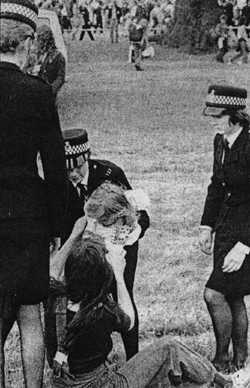 |
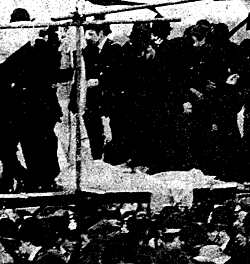 |
Immediately the police began to move on the mass toward the stage. The crowd linked arms in a large group to keep them away and then violence erupted. The police began clubbing. Less than five feet away from where I was standing I saw a police officer punch an obviously pregnant woman in the stomach and when she fell, three others carried her roughly, one with his arm around her throat in a strangle hold, out of the crowd to a waiting prison van. Up on the stage I saw a child who was playing with a policeman's helmet struck twice with a club and thrown from the 9 foot high platform. The child could not have been more than a year and a half old. Other men , women and children were clubbed and thrown from the stage. One, a pregnant woman, was kicked from the stage. Minutes later I learned that she was unconscious and that the police refused to allow a Dr to see her so I personally escorted a doctor from the Divine Light Mission through the cordon -my suit and clerical collar seeming to be some form of pass. I then had to go over and argue with a senior police officer for over five minutes to get permission for an ambulance to take her away. |
| I
returned to the general melee where I threw myself under a truncheon blow
that was aimed at a young boy of about nine or ten and seconds later threw a stranglehold an another policeman who was stomping on the face of a girl of about fifteen. I then gathered together a group of about eight women and children and forced a way out of the battle for them. By the time I returned, the police had gained full control of the stage, were tearing off the planking and carrying away the generator. There were still nine young men up on the scaffolding resisting the attempts of the police to drag them off and hanging on while they tried to topple it with them still on top. Shortly after this I left the battle scene to escort someone who had been on the stage and had been beaten, to the medical tent. Shortly after the scaffolding was toppled and the crowd began to disperse. |
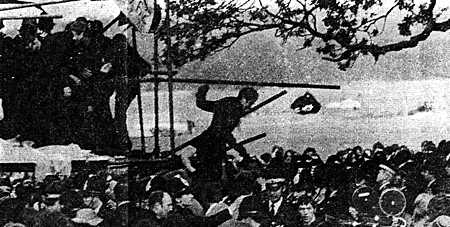 |
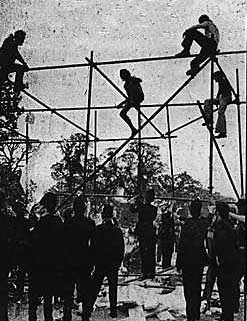 |
The
scene in the medical tent was like that of any wartime field hospital.
Despite the media reports of very few civilian injuries, I learned at
the medical tent that six ambulances of the injured had been dispatched,
some containing as many as nine people. When I mentioned that I had seen a number of long haired people in jeans wearing arm bands being among those who seemed to be intent on an confrontation with the police, and that I had personally seen some of them throwing eggs, tins of vegetables and fruit at the police, he stared at me for a moment and very embarassedly said "those were our men “ |
NB:Although not present at this scene , I can vouch that it was not unusual for police to resent losing their time off when being rostered onto protests and other events such as this . The son of a police sergeant I knew said the officers rostered to be on duty at a large anti springboks demo in 1969 told me that his father stated that the lads ' were going to teach the demonstrators a lesson 'because they had lost their free time. It was the most violent demo of the tour and the police were blamed for much of the aggro that occurred. Although this may not have been the case at Windsor , it may have been a factor in the lack of restraint shown by many of the officers involved.